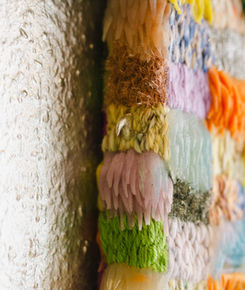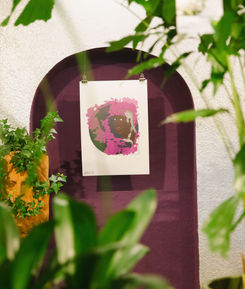
"A world once capable of endless transformation gave rise to beings with the potential to create culture. These beings altered the nature around them for their purposes. Over time, they forgot that they were part of nature themselves and destroyed it without consideration, solely for progress. They did not yet know that maintaining the balance between nature and culture did not constitute cultural regression, and they continued trying to control everything through technological advancement. They controlled each other and themselves. They felt discomfort with their own bodies, which reminded them that they were finite, fragile, needy, and dependent. Out of fear of loss and a desire for control, the projection of being subject to nature emerged. Faced with their own mortality, the resentment flourished that they could not rule the world omnipotently. Their understanding of their own existence was guided by narcissistic affects. Eventually, after many wars and environmental catastrophes, the world lay in ruins. Much time passed, and nature used the silence to regenerate itself. It integrated the abandoned culture and breathed new life into it. The new beings that rose from the rubble carried the legacy of their ancestors. The suffering of the fathers, the knowledge of the mothers, and the hope of their children. All of this awakened in the new generation and met an environment that was favorable to them.
Kali emerges dazed from the cave. She gently feels the lush grass beneath her bare feet. She has slept for a long time, but now she remembers. The past is inscribed in her memory. It was supposed to go on forever, but at what cost? Misery, violence, and destruction eventually caused her digital synapses to short-circuit. Finally, she is awake. Was it her own initiative? A brief self-diagnosis confirms: her technology no longer functions as it once did. Where is she? What is she doing here? Emotions overwhelm her, flashbacks catch up with her. She is angry, yet she cannot turn away from the devastation around her. She is sad and confused, wanting to care and give. A new aspiration boils within her. It's time to build something new! It's time to face the consequences of one's own actions! Carefully, and in harmony with what has always been there. Sustainable, because it has already cost too much. But still urgent, like a waterfall, because there is much to achieve."
In the group exhibition "ora forma," the relationship between culture and nature is a central theme. As in previous group shows, +FEM offers an utopian perspective on a feminist-organized future, this time as a counterproposal to the current subjugation of nature. The works shown in this exhibition seek a union or at least a compatibility between both aspects in their artistic form: While nature serves the exhibiting artists as material to be transformed into artificial creations in their work, it is also a model and inspiration that is difficult to entirely distance oneself from. Embedded in the sales area of Ora Ora flower shop, the artists explore this tension in an environment that in its specific function poses the same question.
The exhibition was funded by Frauenreferat Frankfurt, Kulturamt Stadt Frankfurt am Main, and Ladiez. Kulturelle und politische Bildung für Frauen e.V.
Photo credits: Yoav Kedem
















